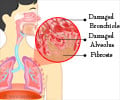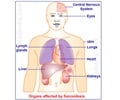A new molecular target that slows or stops the progression of idiopathic pulmonary fibrosis, finds a new study.
- A novel anti-fibrotic drug target that inhibits pulmonary fibrosis was identified by a new study
- A gene called FOXF1 inhibits the progression of pulmonary fibrosis which includes excessive scarring of lung tissue and inflammation.
- Therapeutic tools to boost FOXF1 levels in idiopathic pulmonary fibrosis patients could be an effective therapy to treat the disease.
Idiopathic Pulmonary Fibrosis
Pulmonary fibrosis is a condition where the lung tissue gets scarred making it difficult for the patient to breathe. The cause of idiopathic pulmonary fibrosis remains unknown but genetic predisposition, smoking and other potential environmental factors are suspected. The most common symptoms of the disease include shortness of breath and a persistent dry, hacking cough. It usually affects people between the ages of 50 and 70, but it can strike younger adults and children, according to the National Library of Medicine at the National Institutes of Health (NIH). Around 100,000 people are affected in the United States, with an estimated 30,000 to 40,000 new cases diagnosed annually.Study findings
- A gene called FOXF1 inhibits the progression of idiopathic pulmonary fibrosis.
- Human lungs from IPF patients and mouse models of IPF lack FOXF1 in myofibroblasts.
- Cells lacking FOXF1 exhibited overexpression of a related gene called FOXM1, which drives lung scarring and inflammation.
The team is working on therapeutic tools to boost FOXF1 levels in IPF patients and is currently testing a novel small-molecule compound that stabilizes FOXF1 and inhibits myofibroblasts.
Reference:
- Study Identifies New Molecular Target for Treating Deadly Lung Disease IPF - (https://www.cincinnatichildrens.org/news/release/2018/idiopathic-pulmonary-fibrosis)
Source-Medindia















